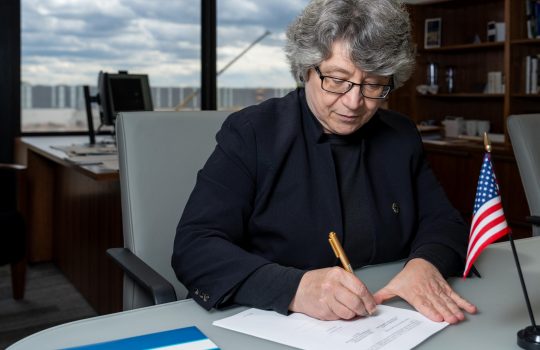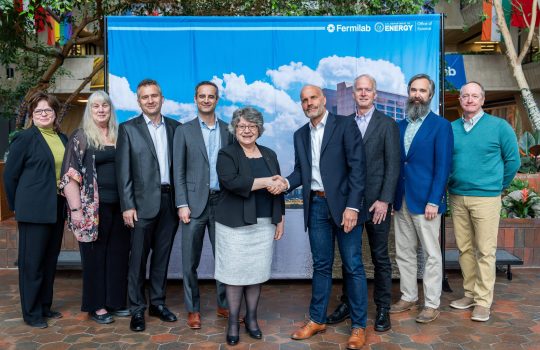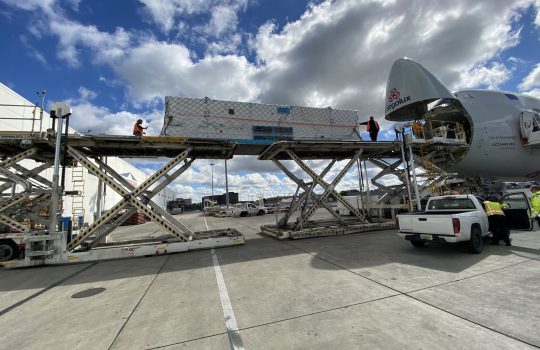CHICAGO, Ill. (April 21, 2006) – Two U.S. Department of Energy laboratories, Argonne National Laboratory and Fermi National Accelerator Laboratory, signed a Memorandum of Understanding today to enhance cooperation between the two laboratories on R&D projects. This cooperation has the potential to increase the possibility of siting the International Linear Collider (ILC), a proposed international, multi-billion-dollar project, in the United States. Jack Lavin, Director of the Illinois Department of Commerce and Economic Opportunity, signed the MOU as witness for the State.
Speaker of the U.S. House of Representatives Dennis Hastert said, “I have always been proud to have Fermilab in my Congressional District, and Fermilab and Argonne are two of the premier research institutions in the world. You don’t have to understand every detail of what happens at these laboratories to know that great ideas come from them. With this new agreement, the position of our nation, and our state, can only be strengthened at the forefront of scientific research. I’m excited to think about the great discoveries to come from these two world-leading labs as they work together even more closely in the years ahead.”
Congresswoman Judy Biggert (R-IL-13), Chairman of the House Science Subcommittee on Energy, which oversees the research and facilities at national laboratories in the United States, said, “A formal partnership between Argonne and Fermi will mean great things for Illinois and the nation. I am confident that this relationship will help cement Illinois’ leadership in the development and use of accelerators for the advancement of science. Collaborative scientific discovery at these two laboratories will help ensure America’s continued economic and scientific competitiveness for generations to come.”
In recognition of the labs’ role as world leaders in accelerator technology, Governor Rod R. Blagojevich issued a proclamation declaring the day as “Particle Accelerator Day” in Illinois, which was read by IDCEO Director Lavin during the signing ceremony at the James R. Thompson Center in Chicago.
“The State of Illinois is very fortunate to host two exceptional federal research laboratories that are advancing scientific discoveries every day, and we are excited to be a part of this unique collaboration between Argonne National Laboratory and Fermi National Accelerator Laboratory,” Governor Blagojevich said. “Since the technology of particle accelerators will translate into significant scientific and economic benefits for our state, I am happy to declare today ‘Particle Accelerator Day’ in Illinois and to encourage everyone to learn more about the contributions of this incredible technology to the world. We are committed to supporting the work of both of these federal labs, and we look forward to helping leverage even larger investments for these important facilities.”
The U.S. Department of Energy has expressed its interest in the possibility of hosting the ILC at Fermilab. Discoveries at the ILC promise to revolutionize our understanding of the fundamental nature of the universe. Previous high-energy physics projects have produced far-reaching applications and technologies, and the development of ILC technologies will benefit Illinois.
“Accelerators – by their power and their precision – continue to shine a bright light on the secrets of nature – from the complex make-up of materials, to taking us back to conditions at the birth of the universe,” said Dr. Raymond L. Orbach, Director of the U.S. Department of Energy Office of Science, which funds Argonne and Fermilab. “Certainly the greatest discoveries are still ahead of us. The Department of Energy welcomes the recognition of the excellence of accelerator research at Fermi and Argonne National laboratories and we look forward to working closely with the State of Illinois as we ensure the strongest possible future for both Fermilab and Argonne.”
Particle accelerators, used in medicine, industry, and scientific research, have played a key role in the remarkable progress of science and technology in the past and will play an even greater role in the future. Emerging accelerator technologies will lead to the construction of unprecedented scientific instruments for the advancement of fundamental research and the development of new materials and methods. If sited in Illinois, these new accelerator complexes will have immediate economic and scientific impact. The new technologies will also find applications in business and industry, agriculture and medicine.
The Governor’s FY2007 Capital Budget request includes a $3-million grant provision to fund the design of an Illinois Accelerator Research Center, to be located at the Fermilab site in Batavia, which would further strengthen the case of Fermilab as a possible host for the ILC project. The Illinois Accelerator Research Center would offer a national and international focal point for accelerator research and industrialization in Illinois. It will enhance the technological sector of the state’s economy, while providing unique educational opportunities for a new generation of engineers and scientists. The major Illinois research institutions-the University of Illinois, Northern Illinois University, Illinois Institute of Technology, the University of Chicago, and Northwestern University-are all active participants in the Fermilab experimental program.
“We are looking forward to building even stronger ties between Fermilab and Argonne,” said Fermilab director Oddone. “These are the two closest national labs geographically, and together they provide a very strong base for the International Linear Collider.”
Argonne Director Robert Rosner said, “This collaboration of national laboratories and universities is unparalleled in the realm of the international science community. The expertise of these two great institutions positions Illinois as a recognized leader in accelerator science.”
About Argonne and Fermilab
Argonne National Laboratory is managed by the University of Chicago, and Fermi National Accelerator Laboratory is managed by Universities Research Association, Inc., for the U.S. Department of Energy Office of Science.
Argonne National Laboratory
The nation’s first national laboratory, Argonne National Laboratory conducts basic and applied scientific research across a wide spectrum of disciplines, ranging from high-energy physics to climatology and biotechnology. Since 1990, Argonne has worked with more than 600 companies and numerous federal agencies and other organizations to help advance America’s scientific leadership and prepare the nation for the future. Argonne is managed by the University of Chicago for the U.S. Department of Energy’s Office of Science.
Fermi National Accelerator Laboratory
Fermilab is home of the Tevatron, the world’s highest-energy particle accelerator, and Argonne operates the Advanced Photon Source, one of the world’s highest-intensity x-ray light sources. Fermilab collaborates closely with Argonne on R&D for the ILC and other future accelerator facilities proposed for Illinois, including heavy ion acceleration, high-intensity neutrino sources, and the Advanced Photon Source upgrade. The Illinois Accelerator Research Center would significantly strengthen the ability of Fermilab and Argonne to compete successfully to host these unique new facilities.
Note for editors:
The full text of the Governor’s proclamation of the “Particle Accelerator Day” is available upon request.



